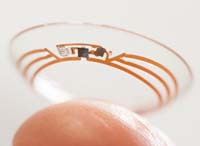 |
|
|
Google is working on a "smart" lens for glucose monitoring. But will it work?
|
The company’s researchers describe it as “a smart contact lens that’s built to measure glucose levels in tears using a tiny wireless chip and miniaturized glucose sensor that are embedded between two layers of soft contact lens material.”
Such a lens would satisfy a tremendous need—but will it work?
Previous research has shown that glucose can be measured reliably in tears, and that tight control of blood glucose reduces the risk of complications, such as retinopathy.1,2 Also, Google’s device would be non-invasive (no more finger pricks) and provide continuous, round-the-clock monitoring—it would signal the wearer with a tiny, built-in LED light when glucose levels go too high or too low.
So, a contact lens that does all these things seems like a home run.
However, this isn’t the first glucose-monitoring contact lens idea; other researchers were investigating it as long as a decade ago.3
But with this lens, the main barrier to widespread use is cost, says Barry Weissman, OD, PhD, professor of optometry at Southern California College of Optometry at Marshall B. Ketchum University.
“Most modern soft lenses are disposable, with planned replacement at one day, two weeks or one month of use. Could this lens, with all its additional high-tech circuitry, be made anywhere near as cost effectively as our other disposable soft lenses? Or would wearers need to wear and care for one single expensive lens over long periods of time?” Dr. Weissman asks.
“This is a nice PR proof of principle for Google,” he adds. “But in practical terms, it is miles away from clinical use, especially for the reason of cost.”
1. Baca JT, Finegold DN, Asher SA. Tear glucose analysis for the noninvasive detection and monitoring of diabetes mellitus. Ocul Surf. 2007 Oct;5(4):280-93.
2. Aiello LP; DCCT/EDIC Research Group. Diabetic retinopathy and other ocular findings in the diabetes control and complications trial/epidemiology of diabetes interventions and complications study. Diabetes Care. 2014 Jan;37(1):17-23.
3. March WF, Mueller A, Herbrechtsmeier P. Clinical trial of a noninvasive contact lens glucose sensor. Diabetes Technol Ther. 2004 Dec;6(6):782-9.

